Have you ever found yourself avoiding your favorite foods or covering your mouth when you laugh? If missing teeth are stealing your confidence and limiting your quality of life, you’re not alone. Thousands of Dallas residents face this challenge every year, but there’s a life-changing solution that’s transforming smiles across our city: dental implants.
Imagine biting into a crispy apple, laughing without hesitation, or speaking with complete confidence—all while knowing your smile looks and feels completely natural. That’s the power of modern dental implants, and Dallas has become a premier destination for this revolutionary treatment.
This comprehensive guide will walk you through everything you need to know about dental implants in Dallas, from understanding the procedure to finding the right provider for your unique needs. Whether you’re just beginning to explore your options or you’re ready to take the next step, we’re here to make this journey clear, stress-free, and empowering.
Key Takeaways
- Dental implants offer a permanent solution to missing teeth with a 95-98% success rate when performed by qualified Dallas specialists
- Cost ranges from $3,000-$6,000 per implant in Dallas, with financing options and insurance coverage available for qualifying cases
- The complete process takes 3-6 months but provides lifetime results that look, feel, and function like natural teeth
- Dallas offers world-class implant specialists with advanced technology and personalized treatment plans
- Medicare and insurance coverage varies, but many patients qualify for partial coverage or financing assistance
What Are Dental Implants? Understanding the Basics
Dental implants are titanium posts that are surgically placed into your jawbone to replace the roots of missing teeth. Think of them as artificial tooth roots that provide a strong foundation for crowns, bridges, or dentures. Unlike traditional dentures or bridges, implants actually integrate with your bone through a process called osseointegration, creating a permanent and stable solution.
The Three Components of a Dental Implant
1. The Implant (Titanium Post) 🦴
This is the foundation—a small titanium screw that’s placed directly into your jawbone. Titanium is biocompatible, meaning your body accepts it naturally and bone grows around it for stability.
2. The Abutment (Connector) 🔗
This small connector piece attaches to the top of the implant and holds your replacement tooth securely in place.
3. The Crown (Artificial Tooth) 👑
This is the visible part—a custom-made tooth that matches your natural teeth perfectly in color, shape, and size.
Why Choose Implants Over Other Options?
Traditional solutions like dentures or bridges have served patients for decades, but they come with limitations. Dentures can slip, require messy adhesives, and may limit your food choices. Bridges require grinding down healthy adjacent teeth, potentially compromising their long-term health.
Dental implants, however, stand alone. They don’t affect your other teeth, they’re permanent, and they actually help preserve your jawbone structure by providing the stimulation that natural tooth roots once provided.
The Dallas Advantage: Why Our City Leads in Implant Excellence
Dallas has emerged as a regional hub for dental implant excellence, and there are compelling reasons why patients travel from across Texas and beyond to receive treatment here.
World-Class Specialists and Technology
Our city is home to some of the nation’s most respected oral surgeons and periodontists who specialize exclusively in implant dentistry. Many Dallas practitioners have trained at prestigious institutions and maintain continuing education in the latest implant techniques and technologies.
Advanced Technology Available in Dallas:
- 3D cone beam CT imaging for precise planning
- Computer-guided implant placement
- Same-day implant and crown procedures
- Minimally invasive surgical techniques
- Digital smile design technology
Competitive Pricing with Premium Quality
While maintaining the highest standards of care, Dallas offers more competitive pricing compared to coastal cities. You can access the same quality of treatment you’d find in New York or Los Angeles, often at 20-30% lower costs.
Comprehensive Care Networks
Many Dallas implant specialists work closely with general dentists, creating seamless care coordination. This means your implant treatment integrates perfectly with your overall dental health plan, and you have ongoing support throughout your journey.
Types of Dental Implants: Finding Your Perfect Solution
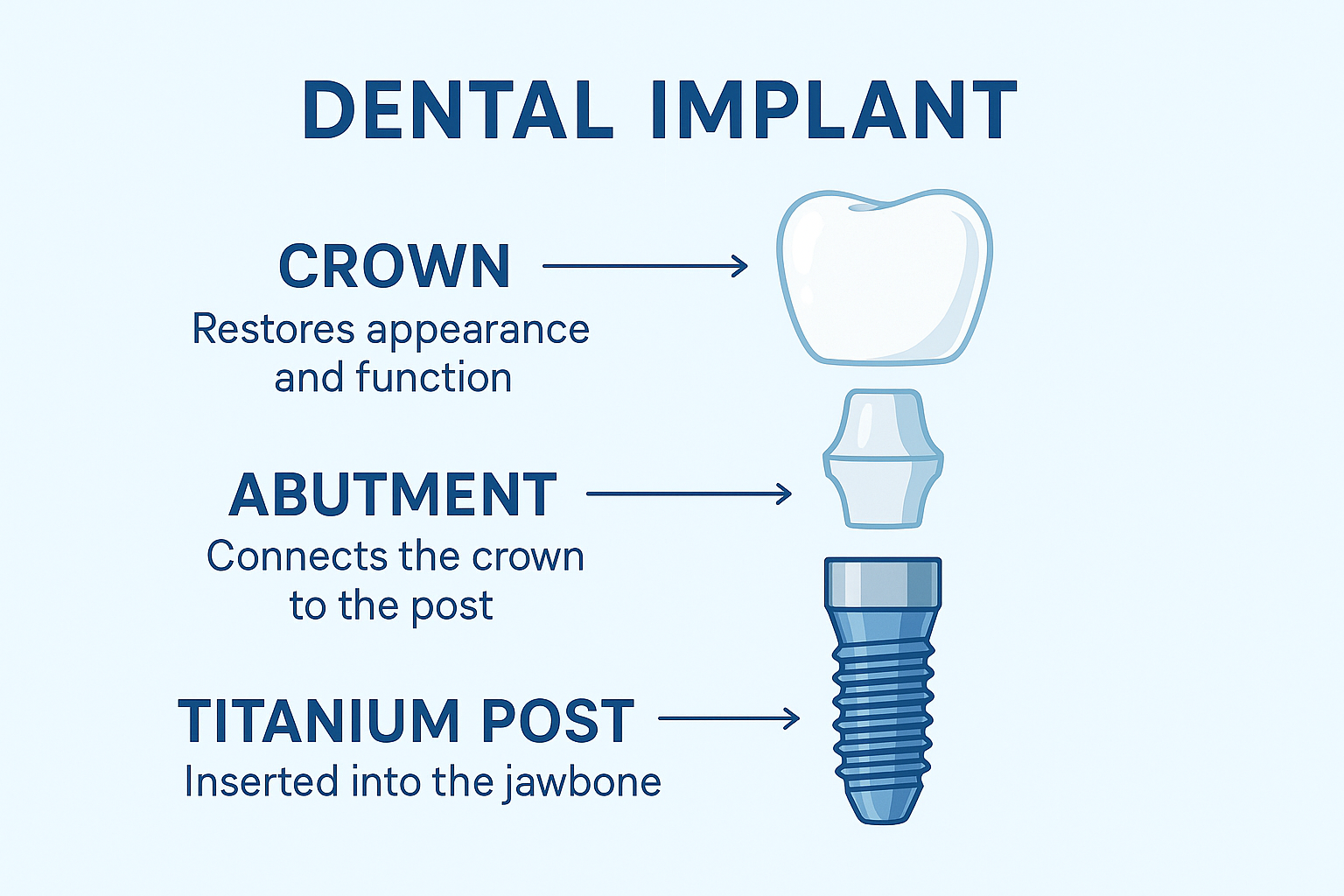
Not all dental implant situations are the same, and Dallas specialists offer various approaches to meet your specific needs.
Single Tooth Implants
Best for: Replacing one missing tooth
Timeline: 3-6 months
Benefits: Preserves adjacent teeth, looks completely natural, functions like your original tooth
Single tooth implants are the gold standard for replacing individual missing teeth. The process involves placing one implant and crown, leaving your other teeth completely untouched.
Multiple Tooth Implants
Best for: Replacing 2-3 consecutive missing teeth
Timeline: 3-6 months
Benefits: More cost-effective than individual implants, stable chewing function
When you’re missing several teeth in a row, implant-supported bridges often provide an excellent solution. Typically, two implants can support three crowns, offering stability while being more economical than three individual implants.
All-on-4 and All-on-6 Full Arch Solutions
Best for: Replacing all teeth in an upper or lower arch
Timeline: Often same-day temporary teeth, final restoration in 3-6 months
Benefits: Full smile transformation, immediate function, cost-effective for full arch replacement
All-on-4 dental implants have revolutionized full mouth restoration. With just four strategically placed implants, you can support an entire arch of teeth. This approach often allows for immediate temporary teeth, so you never go without a smile.
Mini Implants
Best for: Stabilizing loose dentures, smaller spaces, patients with limited bone
Timeline: Often completed in one visit
Benefits: Less invasive, faster healing, lower cost
Mini implants are smaller in diameter and can often be placed with minimal surgery. They’re particularly effective for securing loose lower dentures or in situations where traditional implants aren’t feasible.
The Dental Implant Process: Your Step-by-Step Journey
Understanding what to expect can help ease any anxiety and prepare you for a smooth experience. Here’s exactly what happens during your implant journey in Dallas.
Phase 1: Consultation and Planning (Week 1-2)
Your journey begins with a comprehensive consultation where your Dallas implant specialist will:
- Review your medical and dental history
- Perform a thorough oral examination
- Take 3D imaging (CBCT scan) to assess bone structure
- Discuss your goals and expectations
- Create a personalized treatment plan
- Review costs and financing options
Patient Tip: Come prepared with a list of medications you’re taking and any questions about the procedure. Most consultations take 60-90 minutes and include detailed planning time.
Phase 2: Preparatory Treatments (If Needed)
Some patients need additional procedures before implant placement:
Bone Grafting: If you don’t have enough bone to support an implant, bone grafting can rebuild the area. This adds 3-6 months to your timeline but ensures long-term success.
Tooth Extraction: If a damaged tooth needs removal, this is typically done 8-12 weeks before implant placement to allow proper healing.
Gum Disease Treatment: Healthy gums are essential for implant success, so any periodontal issues must be addressed first.
Phase 3: Implant Placement Surgery (Day 1)
The actual implant placement is often simpler than patients expect:
Before Surgery:
- Local anesthesia ensures complete comfort
- Sedation options available for anxious patients
- Procedure typically takes 1-2 hours per implant
During Surgery:
- Small incision in the gum tissue
- Precise drilling to create the implant site
- Implant placement and site closure
- Temporary restoration if appropriate
After Surgery:
- Detailed post-operative instructions
- Prescription for any needed medications
- Follow-up appointment scheduled
Phase 4: Healing and Integration (3-6 Months)
This is where the magic happens. Your body begins the osseointegration process, where bone grows around and bonds with the titanium implant. During this time:
- Eat soft foods for the first week
- Maintain excellent oral hygiene with special care around the implant site
- Attend follow-up appointments to monitor healing
- Avoid smoking and excessive alcohol, which can impair healing
Phase 5: Final Restoration (Month 3-6)
Once your implant has fully integrated, it’s time for your permanent crown:
- Impression taking for your custom crown
- Temporary crown placement (if needed)
- Final crown placement and adjustment
- Bite adjustment to ensure proper function
- Care instructions for long-term success
💰 Dallas Dental Implant Cost Calculator
Cost of Dental Implants in Dallas: Investment in Your Smile
Understanding the financial aspect of dental implants helps you plan and budget for this life-changing treatment. Dallas offers competitive pricing while maintaining the highest quality standards.
Average Costs in Dallas (2025)
Single Tooth Implant: $3,000 – $6,000
Includes implant, abutment, and crown
Multiple Tooth Implants: $6,000 – $15,000
Cost varies based on number of teeth and complexity
All-on-4 Full Arch: $20,000 – $35,000
Complete arch replacement with four implants
All-on-6 Full Arch: $25,000 – $40,000
Enhanced stability with six implants
Mini Implants: $1,200 – $2,500 per implant
More affordable option for specific cases
Factors That Affect Your Cost
📍 Location and Practice Type
Practices in premium Dallas locations may charge more, but this often reflects advanced technology and specialized expertise.
🦷 Complexity of Your Case
Simple, straightforward cases cost less than complex situations requiring bone grafting or multiple procedures.
🔬 Technology and Materials Used
Advanced imaging, computer-guided placement, and premium implant brands may increase costs but often improve outcomes.
👨⚕️ Surgeon’s Experience and Credentials
Board-certified specialists typically charge more, but their expertise often leads to better results and fewer complications.
Insurance and Financing Options
Many Dallas patients are surprised to learn about available financial assistance:
Insurance Coverage:
- Medicare coverage is limited but may cover certain medical aspects
- Medicaid coverage varies by state and individual circumstances
- Private dental insurance increasingly covers implants, especially Delta Dental plans
Financing Solutions:
- In-house payment plans with 0% interest options
- Third-party financing through CareCredit, Lending Club, or similar providers
- Health Savings Account (HSA) and Flexible Spending Account (FSA) eligible
- Dental schools offering reduced-cost treatment by supervised students
Financial Tip: Many Dallas practices offer free consultations where you can discuss all financial options. Don’t let cost concerns prevent you from exploring your options—solutions exist for most budgets.
Insurance Coverage: Navigating Your Benefits
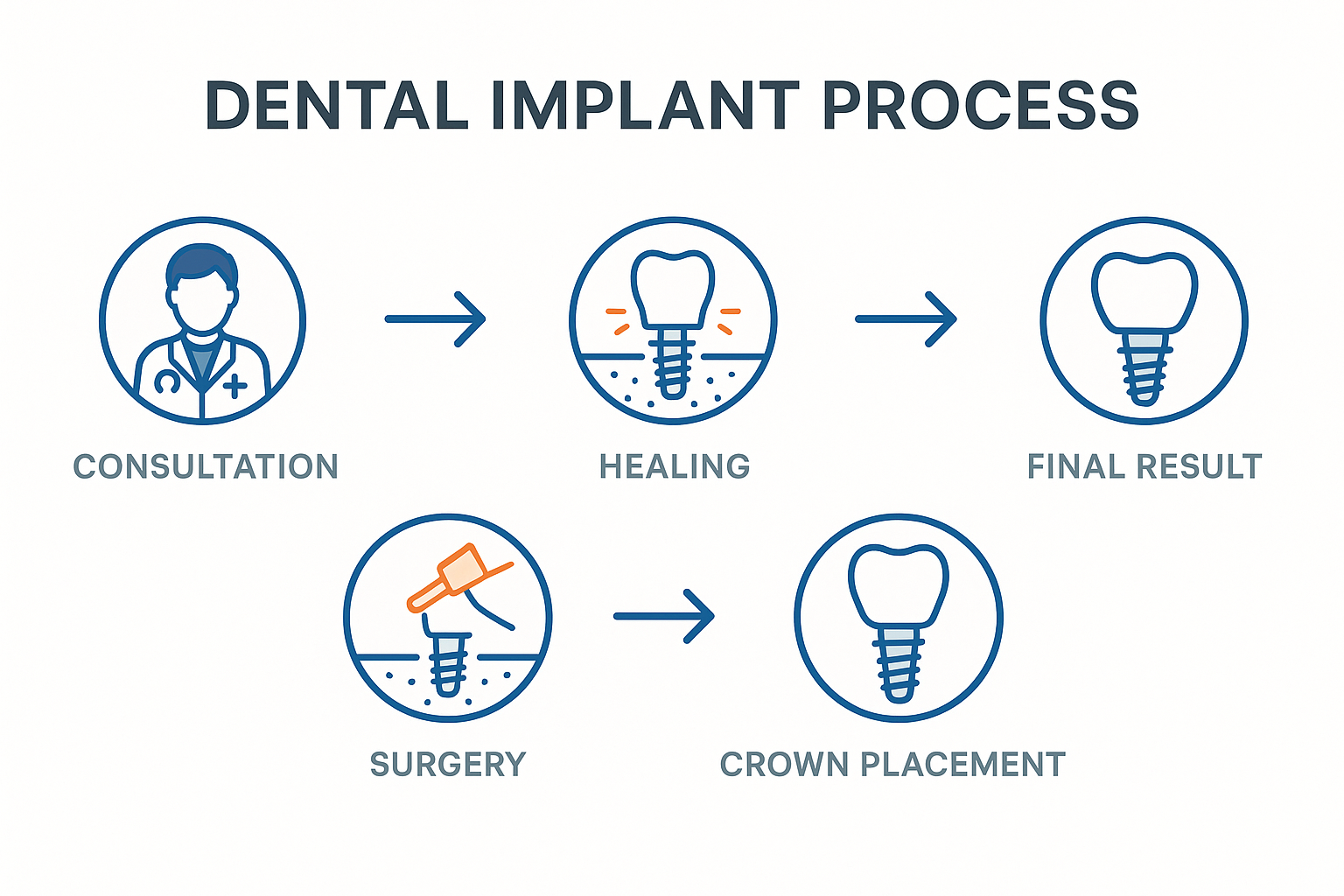
Understanding insurance coverage for dental implants can be complex, but Dallas patients have more options than ever before.
Medicare and Dental Implants
Does Medicare cover dental implants? Traditional Medicare (Parts A and B) typically doesn’t cover dental implants, but there are exceptions:
When Medicare May Help:
- Accident-related tooth loss that requires hospitalization
- Cancer treatment complications affecting oral health
- Congenital conditions requiring reconstructive surgery
- Medicare Advantage plans that include dental benefits
Private Insurance Trends
Dental insurance coverage for implants has improved significantly:
What’s Typically Covered:
- 50-80% of implant procedure under major services
- Consultation and imaging under diagnostic services
- Crown placement similar to other restorative work
Annual Maximums and Waiting Periods: Most plans have $1,000-$2,500 annual maximums and may require waiting periods for major procedures. However, medical insurance may cover dental implants in certain medical necessity situations.
Maximizing Your Benefits
Pre-Authorization Strategy: Work with your Dallas provider to submit detailed treatment plans for pre-authorization. This clarifies exactly what your insurance will cover before treatment begins.
Timing Your Treatment: If you have remaining benefits this year and need multiple implants, consider splitting treatment across calendar years to maximize annual benefits.
Documentation is Key: Proper documentation of medical necessity can sometimes shift coverage from dental to medical benefits, significantly improving your coverage.
Choosing the Right Dallas Implant Specialist
Your choice of implant provider is crucial to your success and satisfaction. Dallas offers many excellent options, but knowing what to look for helps ensure the best outcome.
Essential Qualifications to Verify
Board Certification
Look for specialists certified by the American Board of Oral and Maxillofacial Surgery or the American Board of Periodontology.
Implant-Specific Training
Many general dentists place implants, but specialists with dedicated implant training often have better success rates and can handle complex cases.
Continuing Education
The best providers attend regular courses on the latest techniques and technologies.
Hospital Privileges
Providers with hospital privileges have met additional credentialing requirements and can handle complications if they arise.
Questions to Ask During Your Consultation
Experience Questions:
- “How many implants do you place each year?”
- “What’s your success rate with cases like mine?”
- “Can you show me before and after photos of similar cases?”
Technology Questions:
- “Do you use 3D imaging for planning?”
- “Is computer-guided placement available?”
- “What implant brands do you use and why?”
Process Questions:
- “What’s the timeline for my specific case?”
- “What are the potential complications and how do you handle them?”
- “What’s included in the quoted price?”
Red Flags to Avoid
🚩 Pressure for Immediate Decisions
Reputable providers encourage you to take time to consider your options.
🚩 Prices That Seem Too Good to Be True
Extremely low prices often indicate corners being cut on materials or expertise.
🚩 Lack of Transparency About Costs
Good providers provide detailed treatment plans with clear pricing.
🚩 No Before and After Photos
Experienced providers are proud to show their work.
🚩 Unwillingness to Discuss Alternatives
The best providers present all options, not just the most expensive.
Success Rates and Long-Term Outcomes
Understanding what to expect from your dental implants helps set realistic expectations and prepare for long-term success.
Current Success Rates in Dallas
Modern dental implants have excellent success rates when placed by qualified specialists:
Overall Success Rates:
- Single implants: 95-98% success rate
- Multiple implants: 95-97% success rate
- Full arch restorations: 93-97% success rate
Factors That Improve Success:
- Non-smoking status (smoking reduces success rates by 10-15%)
- Good oral hygiene maintenance
- Regular follow-up care
- Healthy immune system
- Adequate bone density
What “Success” Means
Successful dental implants should:
- Integrate fully with your jawbone (osseointegration)
- Function like natural teeth for chewing and speaking
- Look completely natural and match surrounding teeth
- Last 20+ years with proper care
- Maintain surrounding bone and gum health
Long-Term Care and Maintenance
Daily Care Requirements:
- Brush twice daily with a soft-bristled toothbrush
- Floss daily using implant-specific floss or water flossers
- Use antimicrobial rinse if recommended by your provider
- Avoid hard foods that could damage the crown
Professional Maintenance:
- Regular cleanings every 3-6 months
- Annual X-rays to monitor bone levels
- Professional assessment of implant stability
- Prompt attention to any concerns
Success Story: “I got my implants in Dallas three years ago, and I honestly forget they’re not my natural teeth. I eat everything I want, smile without thinking twice, and my dentist says they look perfect. Best investment I ever made.” – Sarah M., Dallas
Potential Complications and How to Avoid Them
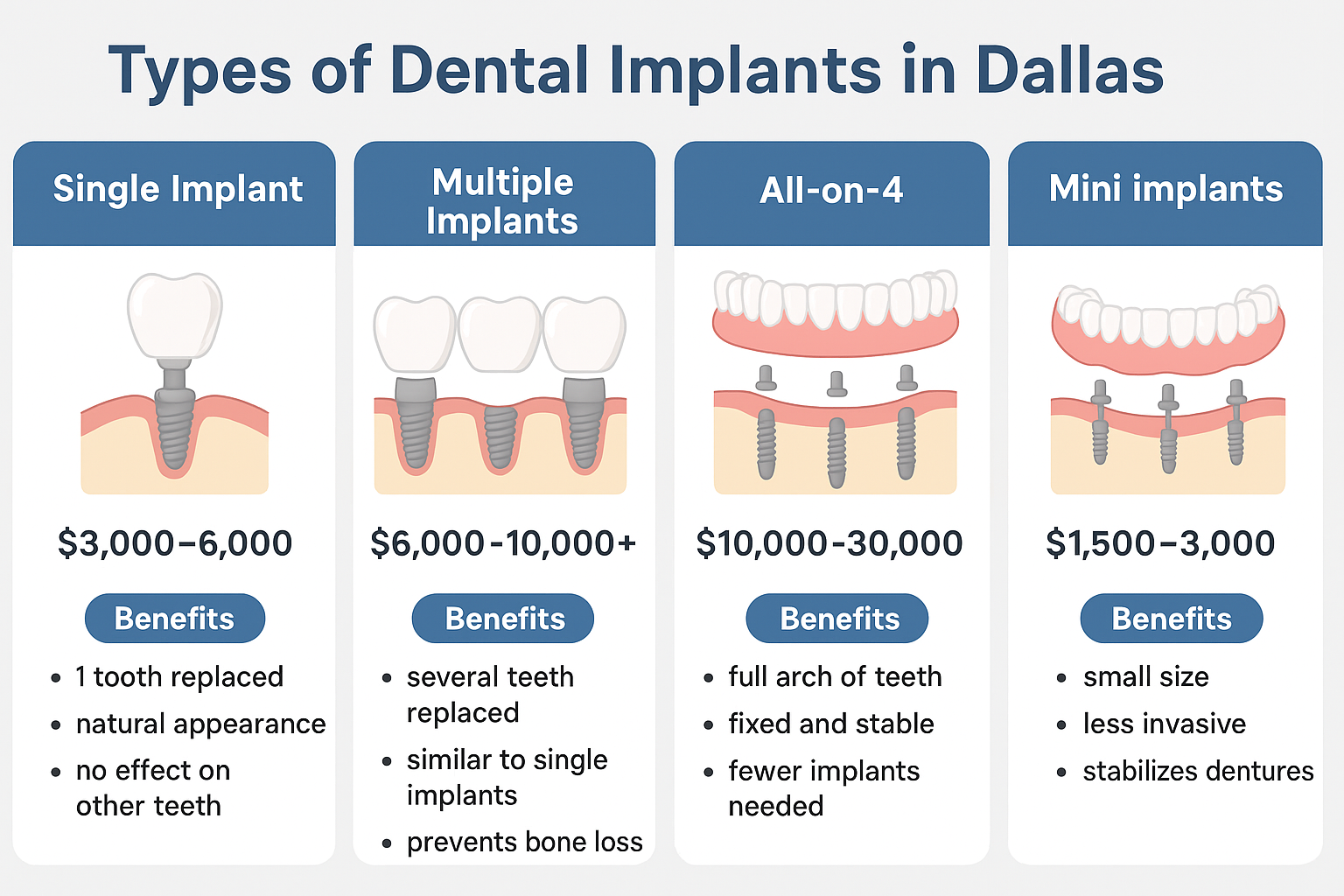
While dental implants have high success rates, understanding potential complications helps you make informed decisions and take preventive measures.
Common Complications and Their Prevention
Infection (Peri-implantitis)
Risk: 1-5% of cases
Prevention: Excellent oral hygiene, regular professional cleanings, avoiding smoking
Treatment: Early intervention with deep cleaning and possible antibiotic therapy
Implant Failure to Integrate
Risk: 2-5% of cases
Prevention: Following post-surgical instructions, avoiding smoking, maintaining good nutrition
Treatment: Implant removal, healing period, possible re-placement
Nerve Damage
Risk: Less than 1% with experienced providers
Prevention: 3D imaging and computer-guided placement
Treatment: Usually temporary, may require medication management
Sinus Problems (Upper Jaw Only)
Risk: 1-3% of upper jaw cases
Prevention: Careful planning with 3D imaging, sinus lift procedures when needed
Treatment: Usually resolves on its own, rarely requires surgical correction
Warning Signs to Watch For
Contact your Dallas provider immediately if you experience:
- Persistent pain beyond the normal healing period
- Swelling that increases rather than decreases
- Implant mobility or looseness
- Unusual discharge or persistent bad taste
- Numbness that doesn’t improve over time
Minimizing Your Risk
Choose an Experienced Provider
Board-certified specialists have significantly lower complication rates.
Follow All Instructions
Post-surgical care instructions aren’t suggestions—they’re essential for success.
Maintain Excellent Oral Hygiene
Most complications are preventable with proper care.
Don’t Smoke
Smoking is the single biggest risk factor for implant complications.
Attend All Follow-Up Appointments
Early detection of problems allows for easier treatment.
Special Considerations for Dallas Patients
Living in Dallas presents unique considerations that can affect your implant treatment and recovery.
Climate and Seasonal Factors
Summer Heat Considerations: Dallas summers can be intense, and heat can increase swelling after surgery. Plan your implant surgery for cooler months if possible, or ensure you have adequate air conditioning during recovery.
Allergy Season Planning: Spring allergies are common in Dallas. Avoid scheduling surgery during peak allergy season if you’re severely affected, as sinus congestion can complicate upper jaw procedures.
Lifestyle Factors
Active Lifestyle Accommodation: Many Dallas residents lead active lifestyles. Discuss your exercise routine with your provider to understand when you can safely return to activities like tennis, golf, or running.
Business Travel Considerations: If your work involves frequent travel, plan your treatment timeline accordingly. You’ll need to be in Dallas for follow-up appointments during the critical healing phases.
Local Resources and Support
Dallas Dental Schools:
- Baylor College of Dentistry offers supervised implant treatment at reduced costs
- Texas A&M College of Dentistry provides specialty training programs
Support Groups: Many Dallas dental practices host patient education seminars and support groups for implant patients.
Pharmacy Networks: Dallas has excellent pharmacy coverage for post-surgical medications, with many locations offering 24-hour service.
Dallas vs. Other Treatment Locations
Many patients consider traveling for dental implant treatment. Here’s how Dallas compares to other popular destinations.
Dallas vs. Dental Tourism
Advantages of Staying in Dallas:
- Continuity of care with easy access to your provider
- No travel stress during healing periods
- Familiar healthcare system and legal protections
- Insurance coverage more likely to apply
- Emergency care readily available
Quality Comparisons: Dallas implant specialists often exceed international standards, with stricter regulations and more comprehensive training requirements.
Cost Analysis: While dental implants abroad may seem less expensive initially, hidden costs like travel, lodging, and potential revision work often make Dallas treatment more economical.
Dallas vs. Other U.S. Cities
Cost Advantages: Dallas typically costs 20-30% less than major coastal cities while offering comparable quality.
Technology Access: Dallas providers often have earlier access to new technologies due to the city’s role as a medical hub.
Specialist Availability: The concentration of dental specialists in Dallas means shorter wait times and more options.
Preparing for Your Implant Surgery
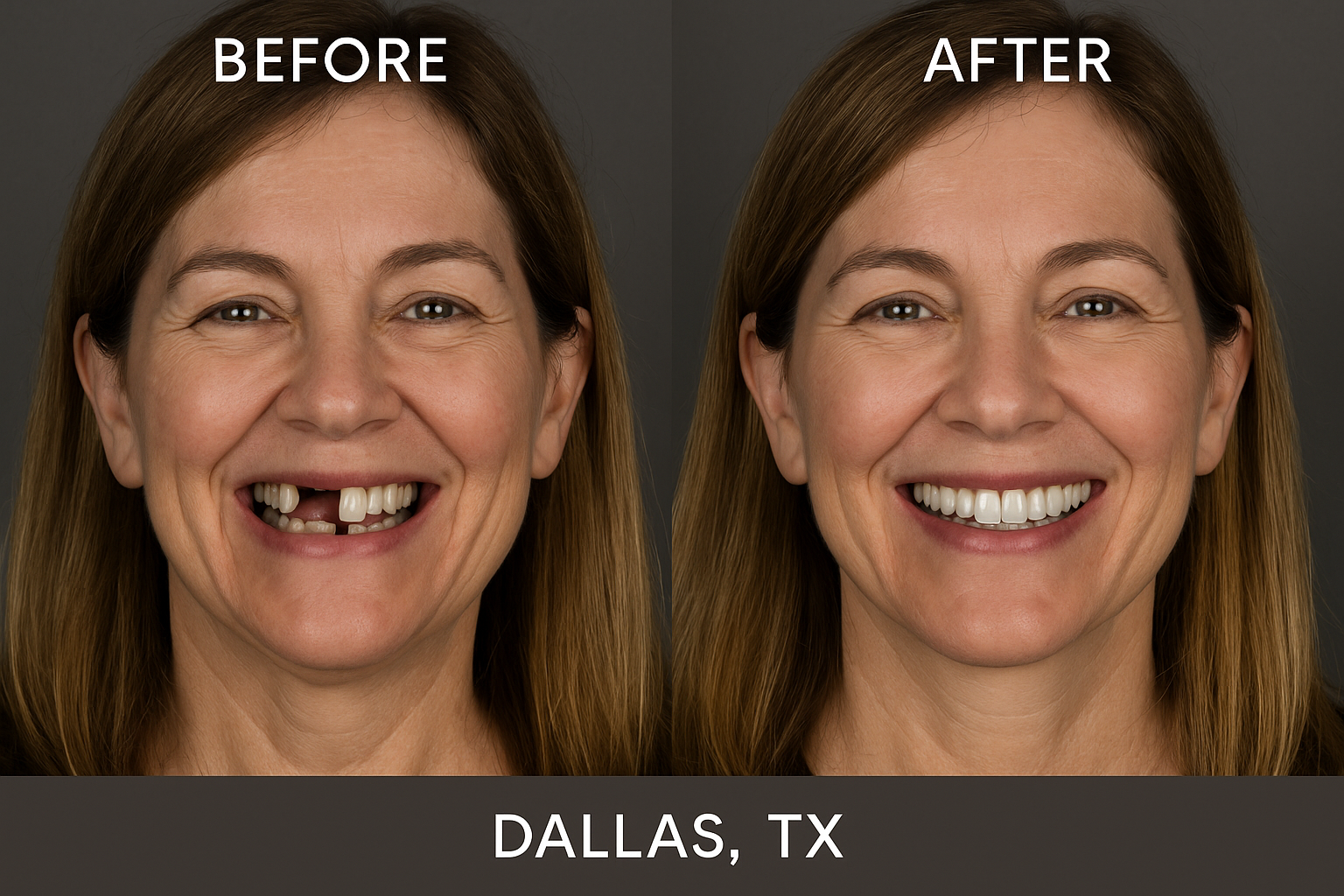
Proper preparation can significantly improve your surgery experience and healing process.
Pre-Surgery Checklist (1-2 Weeks Before)
Medical Preparation:
- Complete all pre-surgical instructions from your provider
- Arrange transportation to and from surgery
- Fill prescriptions in advance
- Stock up on soft foods for recovery
- Plan time off work (typically 2-3 days for single implants)
Health Optimization:
- Stop smoking at least 2 weeks before surgery
- Limit alcohol consumption
- Maintain excellent oral hygiene
- Get adequate sleep to support healing
- Stay hydrated and eat nutritious foods
Practical Preparations:
- Arrange childcare or pet care for surgery day
- Prepare a comfortable recovery area at home
- Have ice packs ready for swelling management
- Set up entertainment (books, movies, etc.) for rest time
Day of Surgery
What to Wear:
- Comfortable, loose clothing
- Short sleeves for easy IV access if sedation is used
- No jewelry or contact lenses
- Comfortable shoes with good support
What to Bring:
- Photo ID and insurance cards
- List of current medications
- Comfort items (pillow, blanket for the ride home)
- Responsible adult to drive you home
What to Expect:
- Arrival 30 minutes early for paperwork
- Pre-surgical discussion with your surgeon
- Anesthesia administration and monitoring
- Surgery duration typically 1-2 hours per implant
- Post-surgical instructions and follow-up scheduling
Recovery and Aftercare: Your Path to Success
The recovery period is crucial for implant success. Understanding what to expect and how to care for yourself ensures the best possible outcome.
First 24-48 Hours: Critical Care Period
Pain Management:
- Take prescribed medications as directed
- Apply ice packs 20 minutes on, 20 minutes off
- Keep your head elevated while sleeping
- Avoid aspirin unless specifically prescribed
Diet Restrictions:
- Soft foods only: yogurt, smoothies, mashed potatoes, soup
- Avoid hot foods for the first 24 hours
- No straws or spitting to protect blood clots
- Stay hydrated with room temperature water
Activity Limitations:
- Rest is essential for the first 48 hours
- No strenuous exercise for one week
- Avoid bending over or heavy lifting
- No smoking or alcohol during healing
Week 1-2: Early Healing
Oral Hygiene:
- Gentle brushing around the surgical site
- Salt water rinses (1/2 teaspoon salt in warm water)
- Avoid the surgical area when brushing initially
- Use prescribed mouth rinse if provided
Diet Progression:
- Gradually add soft foods: eggs, pasta, soft fish
- Chew on the opposite side from the implant
- Continue avoiding hard, crunchy foods
- Maintain good nutrition to support healing
Signs of Normal Healing:
- Mild swelling that peaks at 48-72 hours then decreases
- Some discomfort manageable with prescribed medications
- Minor bleeding for the first day
- Slight bruising around the surgical site
Month 1-3: Integration Period
Returning to Normal Activities:
- Resume normal diet gradually as comfort allows
- Return to regular exercise after one week
- Continue excellent oral hygiene
- Attend all follow-up appointments
What’s Happening: During this period, osseointegration occurs as your bone grows around and bonds with the implant. This process is invisible but crucial for long-term success.
Month 3-6: Final Restoration
Crown Placement Process:
- Healing assessment to confirm integration
- Impression taking for your custom crown
- Temporary crown placement if needed
- Final crown placement and adjustment
Long-Term Success: Living with Your Dental Implants
Once your implants are fully healed and restored, they should function like natural teeth for decades with proper care.
Daily Care Routine
Brushing Technique:
- Use a soft-bristled toothbrush or electric toothbrush
- Brush twice daily for two minutes
- Pay special attention to the gum line around implants
- Use non-abrasive toothpaste to protect the crown
Flossing and Interdental Care:
- Floss daily using implant-specific floss or water flossers
- Use interdental brushes for larger spaces
- Consider antimicrobial rinse if recommended
- Be gentle but thorough around implant sites
Professional Maintenance
Regular Checkups:
- Every 3-6 months for professional cleanings
- Annual X-rays to monitor bone levels
- Implant-specific cleaning techniques
- Early intervention for any issues
What Your Dentist Monitors:
- Implant stability and integration
- Gum health around implants
- Bone levels on X-rays
- Crown condition and bite alignment
- Overall oral health
Lifestyle Considerations
Foods to Enjoy Freely: With properly integrated implants, you can eat almost anything you enjoyed with natural teeth.
Foods to Approach Carefully:
- Very hard foods like ice or hard candy
- Sticky foods that might dislodge crowns
- Extremely hot foods that could damage restorations
Habits to Avoid:
- Teeth grinding (wear a night guard if needed)
- Using teeth as tools (opening packages, etc.)
- Smoking (significantly increases complications)
- Neglecting oral hygiene
When to Consider Dental Implants: Are You a Candidate?
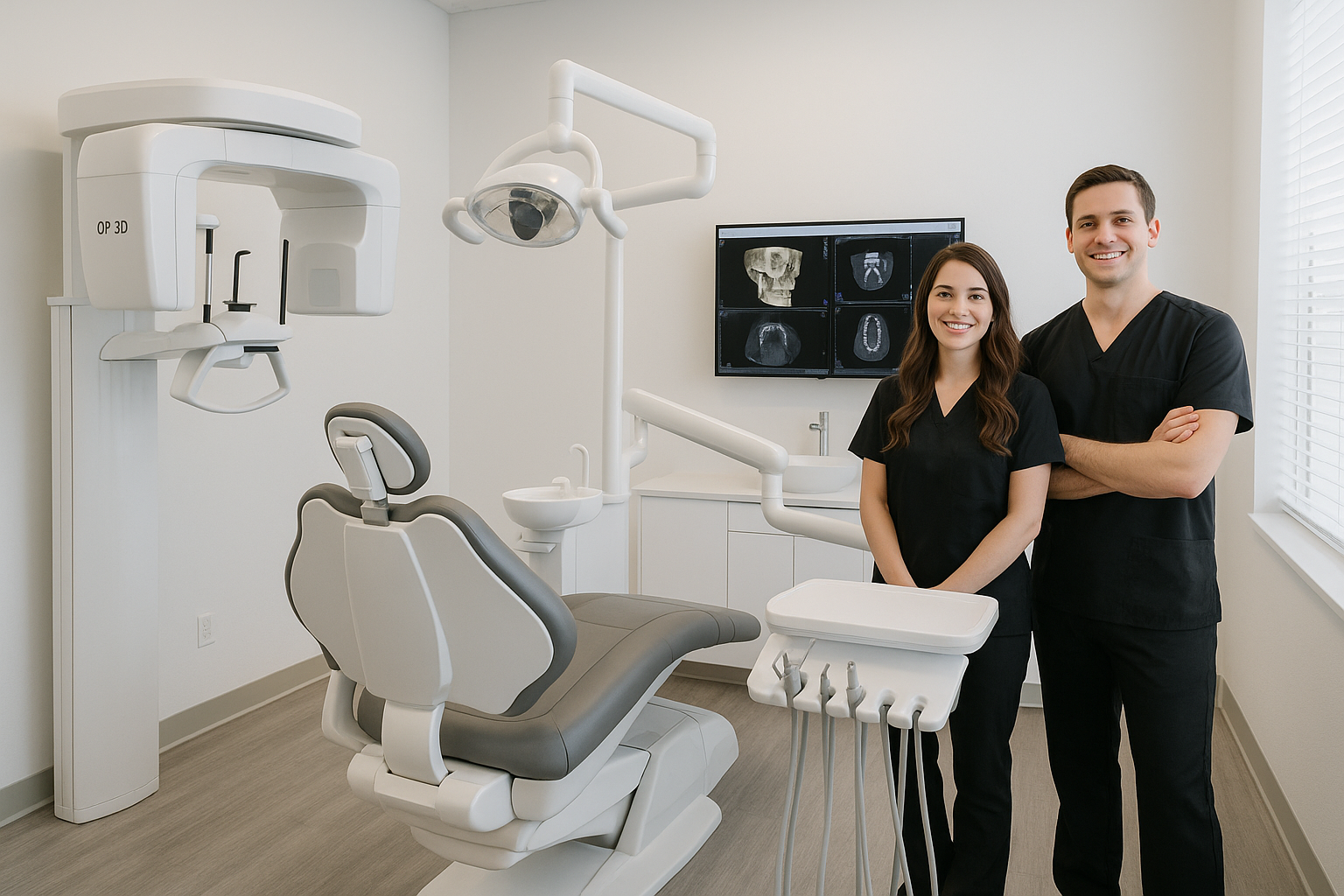
Not everyone is an immediate candidate for dental implants, but many people who think they’re not candidates actually are with proper treatment planning.
Ideal Candidates
Physical Requirements:
- Adequate bone density to support implants
- Healthy gums or treatable gum disease
- Good overall health for healing
- Non-smoking status or willingness to quit
Lifestyle Factors:
- Commitment to oral hygiene and maintenance
- Realistic expectations about the process and outcomes
- Financial readiness for the investment
- Time availability for the treatment process
Common Disqualifying Factors (And Solutions)
Insufficient Bone: Solution: Bone grafting procedures can rebuild bone structure
Active Gum Disease: Solution: Periodontal treatment before implant placement
Smoking: Solution: Smoking cessation programs and support
Certain Medical Conditions: Solution: Medical clearance and coordinated care with physicians
Age Considerations: Too Young: Implants require completed jaw growth (typically 18+ years) Older Adults: Age alone isn’t a disqualifier if health is good
Alternative Solutions
If implants aren’t suitable for your situation, Dallas providers offer excellent alternatives:
Partial Dentures:
- Removable option for multiple missing teeth
- Less expensive than implants
- Shorter treatment time
- May require periodic adjustments
Bridges:
- Fixed solution for 1-3 consecutive missing teeth
- Faster than implants (2-3 weeks)
- Requires alteration of adjacent teeth
- Typical lifespan 10-15 years
Complete Dentures:
- Full arch replacement for all missing teeth
- Most economical option
- Immediate tooth replacement
- May affect speech and eating initially
The Future of Dental Implants in Dallas
Dental implant technology continues to advance rapidly, and Dallas remains at the forefront of these innovations.
Emerging Technologies
Same-Day Implants: Advanced planning and immediate loading protocols allow some patients to receive implants and temporary teeth in a single visit.
3D Printing: Custom surgical guides and even implant components can now be 3D printed for perfect fit and placement.
Advanced Materials: New implant surfaces and materials continue to improve integration speed and success rates.
Digital Dentistry: Computer-aided design and manufacturing (CAD/CAM) technology creates more precise and aesthetic restorations.
Research and Development
Dallas dental schools and research institutions are actively involved in implant research, including:
- Improved osseointegration techniques
- Faster healing protocols
- Better aesthetic outcomes
- Reduced treatment times
Access and Affordability Trends
Insurance Coverage Expansion: More insurance plans are recognizing implants as necessary treatment rather than cosmetic procedures.
Technology Cost Reduction: As technologies mature, costs typically decrease, making implants more accessible.
Financing Innovation: New financing options and payment plans continue to emerge, improving access for more patients.
Celebrity Dental Implants: Inspiration from the Stars
Many celebrities have chosen dental implants to maintain their perfect smiles, and their openness about the process helps reduce stigma and inspire others. Celebrity dental implants demonstrate that this treatment is suitable for people who depend on their appearance for their livelihood.
Notable Celebrity Cases:
- Athletes who’ve lost teeth during sports
- Actors who needed perfect smiles for roles
- Musicians who required clear speech and appearance
- Public figures who chose implants over other options
These success stories show that dental implants can provide natural-looking, functional results that stand up to the scrutiny of high-definition cameras and public appearances.
Making Your Decision: Next Steps
If you’re considering dental implants in Dallas, you’re already on the path to transforming your smile and quality of life. Here’s how to move forward confidently.
Research Phase
Gather Information:
- Read patient reviews of Dallas providers
- Check credentials and certifications
- Compare treatment philosophies and approaches
- Understand financing options
Prepare Questions: Write down your concerns and questions before consultations to ensure you get all the information you need.
Consultation Phase
Schedule Multiple Consultations: Most providers offer free consultations, so take advantage of this to compare options.
Bring Support: Consider bringing a trusted friend or family member to help you remember information and ask questions.
Take Notes: Each consultation will provide valuable information that you’ll want to review later.
Decision Phase
Compare All Factors:
- Provider qualifications and experience
- Treatment approach and timeline
- Total costs and financing options
- Office location and convenience
- Comfort level with the team
Trust Your Instincts: Choose the provider who makes you feel most confident and comfortable with the process.
Conclusion
Your journey to a restored smile through dental implants represents more than just replacing missing teeth—it’s an investment in your confidence, health, and quality of life. Dallas offers world-class implant specialists, advanced technology, and competitive pricing that makes this life-changing treatment accessible to more people than ever before.
Throughout this comprehensive guide, we’ve explored every aspect of dental implants in Dallas, from understanding the basic procedure to navigating insurance coverage and choosing the right provider. The key takeaways are clear: dental implants offer a permanent, natural-looking solution with excellent success rates when performed by qualified specialists.
Your next steps are straightforward:
- Schedule consultations with 2-3 qualified Dallas implant specialists
- Discuss your specific needs and get personalized treatment plans
- Review financing options and insurance coverage
- Choose your provider based on qualifications, comfort, and value
- Begin your transformation with confidence
Remember, thousands of Dallas residents have successfully completed this journey and are now enjoying the freedom and confidence that comes with a complete, beautiful smile. The technology is proven, the specialists are skilled, and the results speak for themselves.
Don’t let missing teeth continue to limit your life. Whether you’re avoiding certain foods, hiding your smile in photos, or feeling self-conscious in social situations, dental implants can restore not just your teeth, but your confidence and quality of life.
Take the first step today by scheduling a consultation with a qualified Dallas implant specialist. Your future self will thank you for making this investment in your health, happiness, and confidence.
For more information about dental implants in Dallas and to connect with qualified specialists in your area, explore our comprehensive resources and take the first step toward your new smile today.

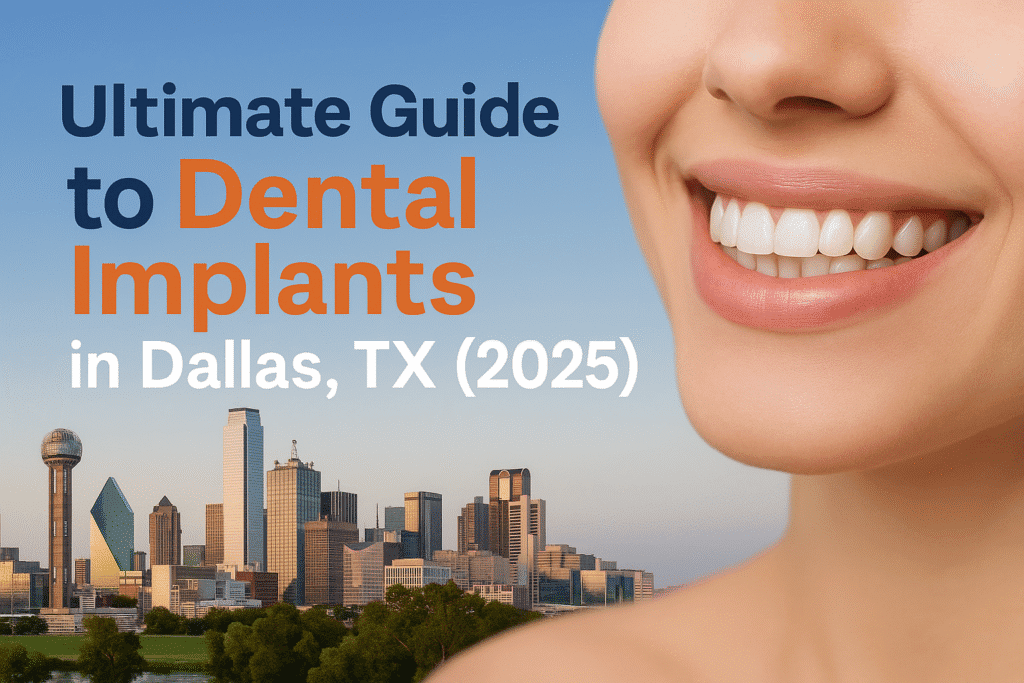
Leave a Reply
Share your thoughts or ask a question about dental implants. Your email address will not be published.